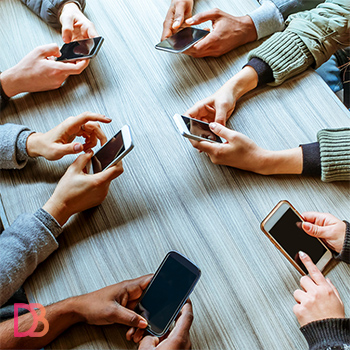Why You Need to Stop Phubbing to Improve Your Relationships
27.05.2020
You probably don’t know the answer to the question, "What does phubbing mean?" Not everyone knows what lies behind the word “phubbing,” but then every modern person has already experienced its effect on themselves. Phubbing is one of the manifestations of dependence on gadgets and the Web, the habit of being distracted by a smartphone during a conversation. When you communicate with someone in person and at the same time, constantly correspond with someone else, leaf through public pages in social networks or make calls, and in fact, ignore your interlocutor. Hence the name: phone + snubbing = phubbing. Today we will talk about the phubbing meaning, look at some phubbing memes, check out phubbing statistics, the effect of phubbing on relationships, and find out how to stop phubbing.
Let’s first talk about the phubbing definition, find out, "What is phubbing?" and the origins of phubbing.

When Did the Phubbing Problem Occur?
The term appeared in 2012 with the light hand of McCann advertising agency employees who purposefully searched for a name for this phenomenon. Around the world, a new word was learned thanks to the Australian STOP PHUBBING anti-phubbing campaign. The official website of the movement contains curious facts.
- If phubbing were a plague, it would kill six times as many people as live in China.
- For one dinner in a restaurant, on average 36 cases of phubbing occur.
- 97% of people admit that food becomes less tasty during phubbing.
- 87% of teens prefer to communicate through messages rather than face-to-face.
Most phubbers use their smartphones to update their status, chat with someone more interesting than a live interlocutor, read jokes, and also search for music, services, and all sorts of nonsense on Google. Etiquette consultants call phubbing the end of civilization. Therefore, the campaign calls for leaving the smartphone in your pocket and returning to the real world.
The signs of phubbing and gadget addiction
- During a meal, a person cannot tear themselves away from the gadget.
- Holding your smartphone in your hand even while walking.
- Instant grip of the smartphone with sound alerts, despite a conversation with a person.
- During a vacation (picnic, birthday, party, walk) a person spends most of their time on the gadget.
- Fear of missing something important in the news feed.
- Baseless paging already seen on the network.
- The desire to spend in the company of the smartphone most of their time.
Have you met such people in the company? And how many jokes on this subject exist, “The wedding was quiet, the restaurant had free Wi-Fi." Coming to a restaurant, first of all, people will learn the password from the Internet. Some institutions are trying to deal with this, deliberately not connecting wireless Internet. The company of friends makes the rules when at the beginning of the evening, everyone puts their phones down, and the first person who takes it pays the total bill in the restaurant.
If your relationship doesn’t seem to work out, and phubbing plays a part in your dissatisfaction, you should find a site to meet single ladies on the Internet and find yourself a partner. Stop trying to restart your old relationship if it doesn’t work out, you constantly deal with ex wife, then move on and start a new love union that will be more fruitful.
The Main Signs of Destructive Phubbing in a Relationship
We are all used to the fact that mobile phones have become an integral part of the life of a modern person. Not surprising, given that a modern smartphone has long outstripped the capabilities of computers from the 90s, and add here the capabilities of mobile Internet. I look at the statistics of site visits and see that half of the traffic comes from mobile devices. But along with all the obvious pluses, the mobile phone is fraught with threats, including for relationships.
And so, a study was published in Computers magazine claiming that cell phone addiction is associated with depression and lower satisfaction with relationships. It is noticed that constant viewing and “sticking” on the screen of a mobile phone creates conflicts and leads to a decrease in overall satisfaction from the relationship. And this leads to a decrease in the level of satisfaction with life and, ultimately, a higher level of depression.
 Examples of phubbing
Examples of phubbing
When we are together, my partner places their mobile phone in such a way as to always see their screen.
“My partner holds their cell phone in their hand when they are near me.”
“My partner is looking at their cell phone while talking to me.”
If there is a pause in our conversation, my partner will check their smartphone.
Interviewing 145 people, it was found:
46% noted signs of phubbing among their partners;
23% said that phubbing led to conflicts in their relationship;
37% admitted that they felt depressed in these situations, at least for a while.
According to researchers, in particular, Dr. Meretid David, interacting with significant people, a distraction to a mobile phone is not given much importance in everyday life. However, the study shows that distracting a partner while talking on a mobile phone can reduce satisfaction with relationships in general.
Psychologist's advice
If you want to maintain a relationship with your loved ones, you should avoid or limit the pauses that occur when viewing a mobile phone. When you listen to a partner with one ear, and at the same time are passionate about reading information on the screen of your smartphone, this can be harmful to your relationship. Try to distinguish between these two things: communication with loved ones and reading news on the Internet!
What Do Experts and Statistics Say?
You are engaged in phubbing if you are occasionally distracted by a smartphone in a conversation with someone: scroll the social media feed, check work chats, and mail. Sometimes lovers who do this can even add, "Go on, I listen."
“I noticed that some clients are tempted to peek into a smartphone during a psychotherapy session,” said co-author of the study, social psychologist Naif Ergun from the Mardin University of Artuklu in Turkey.
To study the causes and consequences of phubbing, psychologists invited two groups of volunteers to participate in the study. The participants of the first group, which included 576 volunteers from 18 to 76 years old, had to admit their habit of checking gadgets endlessly. Participants in the second group, 510 volunteers from 18 to 58 years old, spoke about interlocutors who sometimes ignore them.
It turned out that phubbing not only creates a tense atmosphere between people but can also indicate depression, anxiety, low self-esteem, and hostility to the interlocutor.
Oddly enough, phubbing did not correlate with loneliness. Scientists explain this by the fact that active users of social networks often do not see the difference between virtual and real communication.
Main Ways How to Overcome a Phubbing Problem
How to stop phubbing? According to the psychologist and psychotherapist Maria Eril, the habit of checking the gadget every now and then is associated with many reasons. It is important to understand what exactly becomes a trigger. Phubbing may be an attempt to avoid a stressful situation, a fear of missing out on something important, and even a sign of the obsessive-compulsive disorder. In the latter case, our expert recommends monitoring the nature of the obsession. If the alarm is deep, a person is not able to fight it and feels a panic attack, losing sight of the phone, then this is a good reason to consult a specialist. But you can cope with addiction yourself if you show awareness and willpower.
1. Observe yourself in real-time
Here’s the first of solutions for phubbing. At what point is the desire to grab the gadget the most? Perhaps you are running away from reality on the phone, not wanting to conflict, answer provocative questions, or solve a problem. Having determined the reason, it will be easier for you to resolve the situation and stop hiding in the "shell."
2. Before reaching for the gadget, ask yourself, "Why?"
How to stop phubbing around? Always set yourself a clear task: reply to a message, call, write an e-mail, then phubbing will come to naught.
3. The system of personal rules will also help ease dependence
Coming to a meeting with a friend, promise yourself not to pick up the phone for at least the first half-hour. Turning to the gadget, tactfully ask the interlocutor if this offends them.
4. Limit time spent online
Mobile applications can help in this matter. By installing one of these programs, you will not only receive a notification that it is time to return to real life but also visually evaluate who you are communicating with and how many hours it takes for your favorite social network. Hard timing will save you from phubbing.
5. Give yourself a day of silence
Make it a rule at least once a week instead of aimless Internet surfing just to walk in the fresh air. Allow the body to rest and reboot to the head.
6. Try not to use gadgets in person
Think of it as a rule of etiquette, the same as not picking a fork in your teeth. If you urgently need to write to someone, apologize to the other person and do it quickly, rather than sit in the chat room for half an evening. To answer the call, apologize, and step back briefly.
7. Do not place your smartphone on the table while eating
This is bad manners. Besides, you increase the temptation to grab it again and visit social networks. Put gadgets on the table only if the whole company collects them in a heap with an agreement that the first one reaching for the phone will be punished. For example, in cash.
8. Buy a cheap phone
Suitable for those who do not need to be constantly in touch in the mail and instant messengers. There will be no opportunity to surf the Internet - there will be no phubbing.
9. Ask to call you on important issues, do not write
Make arrangements with colleagues, friends, and relatives to call you on all urgent matters if you are afraid that you will miss something urgent. This will help wean yourself from checking messages every ten minutes.
10. Determine what you usually do on phubbing time and why
If it is sending messages, see the previous two points. If this is news, interesting things, and games that are difficult to tear yourself away from, then unsubscribe from them, delete them, or make their use uncomfortable. For example, leave the application on a tablet that is not always with you, but delete it from your smartphone. The most daring can delete an account in at least one social network.
If you are fabulous because friends do so, tell them directly that you don’t like this style of communication. Suggest options for what to do instead of collective sitting with gadgets. If you grab onto the phone because you don’t know what to talk about, read about the art of talking, or just any book - you will already have something to discuss.
Phubbing can be treated differently. It is up to you to decide whether to fight this habit and if so, how radically. But you see, the future, in which everyone is sitting in silence, having buried themselves in their smartphone and forgotten how to talk face to face, seems sad.
